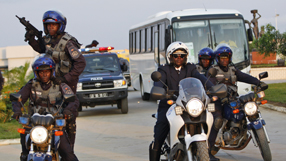
Friday's attack, in which the driver was also killed and seven others were injured, took place in Cabinda, a province where guerrillas have fought a secession campaign for decades.
"We lost the assistant coach and the press officer," said Messan Attelou, chief spokesman for Togo's football federation.
He said Togo had not yet decided whether to pull out of the tournament.
"We are going now to see and talk to the players and then make a decision whether or not we take part in the competition," he told Reuters at Cabinda airport.
Togolese officials named the dead men as media officer Stanislas Ocloo and assistant coach Amalete Abalo, and said reserve goalkeeper Kodjovi Obilale had been evacuated to Johannesburg for medical treatment.
The attack came five months before South Africa hosts the World Cup, the first African nation to hold the world's biggest single sport event.
Virgilio Santos, an official with the African Nations Cup local organising committee COCAN, said teams had been told explicitly not to travel to the tournament by road.
The best features, fun and footballing quizzes, straight to your inbox every week.
"We asked that all delegations inform us when they would arrive and provide the passport number of their players," he told the sports weekly A Bola.
"Togo was the only team not to respond and did not inform COCAN it was coming by bus ... The rules are clear: No team should travel by bus. I don't know what led them to do this."
The Front for the Liberation of the Enclave of Cabinda (FLEC) claimed responsibility for the attack.
BLOW FOR AFRICA
A shaken Togo captain Emmanuel Adebayor, who escaped the attack unharmed, said his team might quit the African Nations Cup, which is due to open on Sunday and feature some of the world's most valuable players.
Adebayor, who joined Manchester City for a reported 25 million pounds last year, said the attack would hurt the image of Africa as a whole.
"We keep repeating (that) - Africa, we have to change our image if we want to be respected - and unfortunately that is not happening," Adebayor told the BBC World Service.
"A lot of players want to leave. They have seen death and want to go back to their families."
Cabinda, the scene of attacks by separatists even after Angola's 27-year civil war ended in 2002, is responsible for half of oil production in Angola, which rivals Nigeria as Africa's biggest producer.
The Togo team bus, travelling from its training ground in the Republic of Congo, had just entered the enclave, geographically cut off from the rest of Angola, when it came under heavy gunfire.
A crisis meeting was expected to take place in the Angolan capital Luanda between local officials and the Confederation of African Football (CAF) over tournament security.
Former Togo coach Otto Pfister said the assault would cast a shadow over the World Cup.
"This is a real blow for Africa. It will obviously be linked directly with the W
 Join The Club
Join The Club





